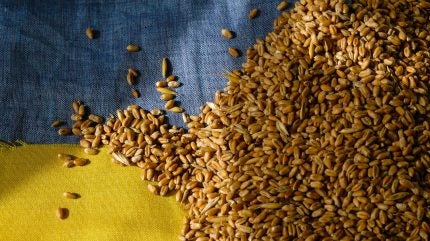
The European Commission is extending a deal that allows five EU member states to restrict grain imports from Ukraine.
The agreement with Bulgaria, Hungary, Poland, Romania and Slovakia, first struck in May, was set to elapse yesterday but will continue until 15 September.

Discover B2B Marketing That Performs
Combine business intelligence and editorial excellence to reach engaged professionals across 36 leading media platforms.
The original deal was done after the five EU members banned imports of grain and selected other foodstuffs from Ukraine to protect prices for domestic farmers.
The countries were unhappy farmers were having to compete with cheap imports coming in from neighbouring Ukraine.
The EU had described the unilateral moves as unacceptable and convened talks with the five countries and Ukraine.
A deal described as “exceptional and temporary preventive measures on imports of a limited number of products” from Ukraine was finalised on 2 May. In its new statement, issued yesterday, the Commission said it is “phasing out” the measures by 15 September.

US Tariffs are shifting - will you react or anticipate?
Don’t let policy changes catch you off guard. Stay proactive with real-time data and expert analysis.
By GlobalData“These measures continue to be necessary for a limited period of time given the exceptional circumstances of serious logistical bottlenecks and limited grain storage capacity ahead of the harvest season experienced in five member states,” the European Commission said as it announced its extension.
“These measures were adopted due to logistical bottlenecks concerning these products in Bulgaria, Hungary, Poland, Romania and Slovakia, and on the condition that member states do not maintain any restrictive measures.”
The German Federal Ministry of Food and Agriculture (BMEL) said it disapproved of the decision and called for countries to support Ukraine in other ways.
“We urgently need to return to a coordinated and united approach by the Commission and the Member States and thus ensure a functioning EU internal market. The fact that the Commission has now extended the EU safeguard clauses does not contribute to our European solidarity with Ukraine, but only plays into Putin’s hands,” the BMEL said.
“Since the beginning of the war, the Russian ruler has left no stone unturned to divide the international community and damage Ukraine economically. But we can only overcome challenges together – and that means: as Europe, we stand by Ukraine’s side and, on the basis of rules and facts, provide help for the member states whose markets are suffering from the consequences of Putin’s madness. In the end, national solo efforts harm us all.”
The Commission said the deal centred on four products – wheat, maize, rapeseed and sunflower seed.
The imports of the four foodstuffs from Ukraine can continue to enter other EU states and transit through the country’s five concerned neighbours.



